
Punjab is one of the four provinces of Pakistan. Located in centraleastern region, Punjab is the second-largest province of Pakistan by land area and the largest province by population. It shares land borders with the Pakistani provinces of Khyber Pakhtunkhwa to the north-west, Balochistan to the south-west and Sindh to the south, as well as Islamabad Capital Territory to the north-west, Autonomous Territory of AJK to the north and International border with the Indian states of Rajasthan and Punjab to the east and Indian-administered Kashmir to the north-east. Punjab is the most fertile province of the country as River Indus and it's four major tributaries Ravi, Jhelum, Chenab and Sutlej flow through it.

Rajasthan is a state in northern India. It covers 342,239 square kilometres (132,139 sq mi) or 10.4 per cent of India's total geographical area. It is the largest Indian state by area and the seventh largest by population. It is on India's northwestern side, where it comprises most of the wide and inhospitable Thar Desert and shares a border with the Pakistani provinces of Punjab to the northwest and Sindh to the west, along the Sutlej-Indus River valley. It is bordered by five other Indian states: Punjab to the north; Haryana and Uttar Pradesh to the northeast; Madhya Pradesh to the southeast; and Gujarat to the southwest. Its geographical location is 23.3 to 30.12 North latitude and 69.30 to 78.17 East longitude, with the Tropic of Cancer passing through its southernmost tip.

Tripura is a state in northeastern India. The third-smallest state in the country, it covers 10,491.69 km2 (4,050.86 sq mi) and is bordered by Bangladesh to the north, south, and west, and the Indian states of Assam and Mizoram to the east. In 2011 the state had 3,671,032 residents, constituting 0.3% of the country's population.

The Aravalli Range is a mountain range in Northern-Western India, running approximately 670 km (420 mi) in a south-west direction, starting near Delhi, passing through southern Haryana, Rajasthan, and ending in Ahmedabad Gujarat. The highest peak is Guru Shikhar on Mount Abu at 1,722 m (5,650 ft). The Aravalli Range is arguably the oldest geological feature on Earth, having its origin in the Proterozoic era.
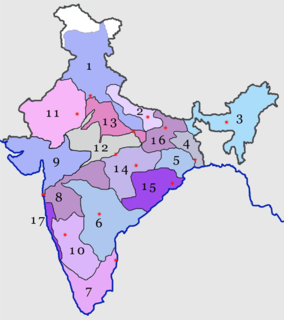
The North Western Railway is one of the 19 railway zones in India. It is headquartered at Jaipur,Rajasthan with 59,075+ employees, 658+ stations and a route length of more than 5761 km across at least some parts of four states of Rajasthan, Gujarat, Punjab and Haryana. NWR operates international rail service Thar Express from Jodhpur to Karachi. This zone is the key enabler of the Delhi–Mumbai Industrial Corridor Project by virtue of running railways 1,500 km long Western Dedicated Freight Corridor.
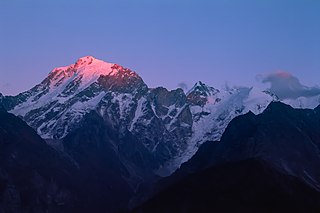
North India is a loosely defined region consisting of the northern part of India. The dominant geographical features of North India are the Indo-Gangetic Plain and the Himalayas, which demarcate the region from the Tibetan Plateau and Central Asia.
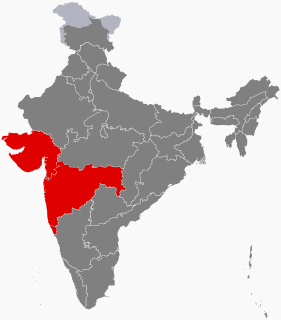
Western India is a loosely defined region of India consisting of its western part. The Ministry of Home Affairs in its Western Zonal Council Administrative division includes the states of Goa, Gujarat, and Maharashtra along with the Union territory of Dadra and Nagar Haveli and Daman and Diu, while the Ministry of Culture and some historians also include the state of Rajasthan. The Geological Survey of India includes Maharashtra but excludes Rajasthan whereas Ministry of Minority Affairs includes Karnataka but excludes Rajasthan.
The administrative divisions of India are subnational administrative units of India; they are composed of a nested hierarchy of administrative divisions.
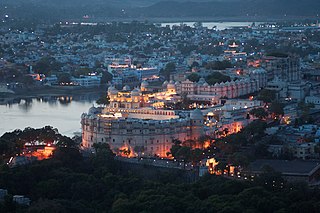
Udaipur, historically named as Udayapura, is a city and municipal corporation in Udaipur district of the state of Rajasthan, India. It is the administrative headquarter of Udaipur district. It is the historic capital of the kingdom of Mewar in the former Rajputana Agency. It was founded in 1559 by Udai Singh II of the Sisodia clan of Rajput, when he shifted his capital from the city of Chittorgarh to Udaipur after Chittorgarh was besieged by Akbar. It remained as the capital city till 1818 when it became a British princely state, and thereafter the Mewar province became a part of Rajasthan when India gained independence in 1947.
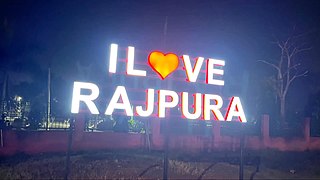
Rajpura is an urban town in Patiala district in the Indian state of Punjab, India, situated along the border of the Indian state of Haryana. It is located 26 KM Patiala city, towards East from District Head Quarter. It is Tehsil Head Quarter. Rajpura is the largest tehsil of the district.
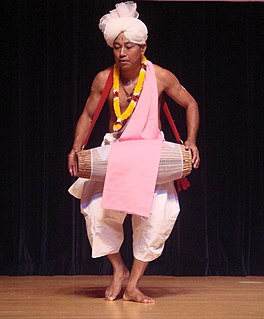
North East Zone Culture Centre in Chümoukedima in Nagaland state is one of many regional cultural centres established by the Indian Government to preserve and promote traditional cultural heritage of India. The North East Cultural Zone is one of seven Cultural Zones of India defined and provided with administrative infrastructure by the Government of India.
The West Zone Culture Centre in Udaipur, Rajasthan is one of seven Cultural Zones established by the Government of India to preserve and promote India's traditional cultural heritage. The centre works to retain and develop regional cultural resources, including traditional and tribal arts. It is provided with administrative infrastructure by the Government of India.
South Zone Culture Centre (SZCC). an autonomous organisation by Ministry of Culture (India) Ministry of culture at Tamil Nadu state is one of many regional cultural centres established by Indian Government to preserve and promote traditional cultural heritage in India.Each zonal center also works to cross-promote and create exposure to other cultural zones of India by organizing functions and inviting artistes from other zones. The current Chairman of the SZCC is the Governor (India) of Tamil Nadu, Banwarilal Purohit. The South zone cultural centre is one of seven Cultural Zones in India defined and provided with administrative infrastructure by the Government of India.

The Ministry of Culture is the Indian government ministry charged with preservation and promotion of art and culture of India.

Punjab is a state in northern India. Forming part of the larger Punjab region of the Indian subcontinent, the state is bordered by the Indian states of Himachal Pradesh to the north and northeast, Haryana to the south and southeast, and Rajasthan to the southwest; by the Indian union territories of Chandigarh to the east and Jammu and Kashmir to the north. It shares an international border with Punjab, a province of Pakistan to the west. The state covers an area of 50,362 square kilometres, which is 1.53% of India's total geographical area, making it the 19th-largest Indian state by area out of 28 Indian states. With over 27 million inhabitants, Punjab is the 16th-largest Indian state by population, comprising 23 districts. Punjabi, written in the Gurmukhi script, is the most widely spoken and the official language of the state. The main ethnic groups are the Punjabis, with Sikhs and Hindus as the dominant religious groups. The state capital is Chandigarh, a union territory and also the capital of the neighbouring state of Haryana. The five tributary rivers of the Indus River from which the region takes its name are the Sutlej, the Beas, the Ravi, the Chenab and the Jhelum. Of these, the first three flow through Indian Punjab, while the latter two flow entirely through Punjab, Pakistan.
The Cultural Zones of India are seven overlapping zones defined by the Ministry of Culture of the Government of India to promote and preserve the cultural heritage of various regions of India. Each of these zones has been provided with a zonal centre. Most zonal centres were announced by the then-Prime Minister of India, Rajiv Gandhi, in 1985 and formally began functioning in the 1986–87 period. Their stated goal is "to strengthen the ancient roots of Indian culture and evolve and enrich composite national culture".

The term North Indian Culture officially describes the cultural heritage of the eight North Indian states of Punjab, Uttarakhand, Jammu & Kashmir, Chandigarh, Haryana, Delhi, Himachal Pradesh, Rajasthan and Uttar Pradesh. Other states which are not formally part of North India, but which are traditionally — culturally and linguistically — seen to be so are Gujarat, West Bengal, Jharkhand, Madhya Pradesh, Maharashtra and Bihar. North Indian culture reflects the diversity of traditions and customs of the vast region it encompasses. North Indian Culture is mainly in sanatana traditions and customs, with the assimilation of — and impact from — other cultures over long periods of history. North Indian culture reflects the diversity of traditions and customs of the vast region it encompasses.

The East Zone Cultural Centre has its headquarters in Sector III, IB 201, IB Block, Salt Lake City, Kolkata, which is also known as the Cultural Capital of India and most commonly City of Joy is situated in the Indian state of West Bengal.It is one of the seven Zones established in India.The Indian states which are under the Eastern Cultural Zone are West Bengal, Jharkhand, Bihar, Odisha, Assam, Tripura, Manipur, Sikkim, Andaman & Nicobar Islands. This zone is home to three classical dance Odissi, Sattriya and Manipuri dance. Classical music Odissi music and semi-classical music Rabindra Sangeet. Odia is one of Classical language in India and only living classical language from Eastern India.

Shilpgram is a rural arts and crafts complex, situated 3 km (1.9 mi) west of the city of Udaipur, India. The center is spread over an undulating terrain of about 70 acres of land, surrounded by the Aravali mountains. Shilpgram is an ethnographic museum that depicts the lifestyles of the folk and tribal people of the region. With an objective of increasing awareness and knowledge about the rural arts and crafts, the Shilpgram provides opportunity for rural and urban artists to come together and interact through the process of camps and workshops.
The South-Central Zone Cultural, Nagpur or SCZCC one of the seven Zonal Cultural Centres in India was established in 1986 with its headquarters at Nagpur. It comprises the linguistically different states of Andhra Pradesh, Karnataka, Madhya Pradesh, Telangana, Chhattisgarh, Goa and Maharashtra. Each of these States has rich traditions of folk, tribal, fine arts and crafts. The Centre strives through its various activities to enrich, promote and strengthen these traditions. The centre is working under the control of Ministry of Culture, Government of India. The Governor of Maharashtra is the chairman of this centre.















